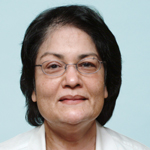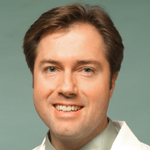Nigar Kirmani, MD, and Douglas Larsen, MD, have been selected to receive the 2012-14 Carol B. and Jerome T. Loeb Teaching Fellowships at Washington University School of Medicine.
The fellowship program was established in 2004 by a gift from the Loebs to advance clinical education and to honor local physicians committed to clinical excellence.
Strengthened by a gift from the Barnes-Jewish Hospital Foundation, the program allows the fellows to take time from their regular duties to teach clinical medicine to students and residents. The two-year fellowships begin July 1 and continue through June 30, 2014.
Applicants for the fellowships are chosen for their record of excellence in patient care and clinical teaching. Their proposals must meet new or unmet clinical teaching needs for residents and/or students and include time spent in direct teaching and in program and curriculum development.
In addition, applicants must show innovative teaching methods and a plan to continue the curriculum or project following completion of their Loeb Teaching Fellowship term. All proposals are reviewed by a selection committee appointed by Larry J. Shapiro, MD, executive vice chancellor for medical affairs and dean of the School of Medicine.
“Nigar and Doug have developed excellent programs that will give our medical students and trainees an even more experiential training opportunities,” Shapiro says. “We are grateful to the Loebs for this gift, which continues to provide innovative learning experiences for our students.”

To enhance the training of students, residents and fellows, Kirmani, professor of medicine will develop new physician-education programs in infection prevention and hospital epidemiology and patient safety.
She plans to develop interactive, web-based training modules that will allow trainees to access information when needed. The modules will include a pretest, a case study and a post-test.
Students will learn about infection prevention using cases of Clostridium difficile colitis, meningococcal meningitis, herpes zoster in patients with compromised immune systems, infections in patients with HIV, as well as patient safety issues such asdrug interactions and transitions of care. In addition, students will gain extensive knowledge about the use and overuse of antibiotics.
“Dr. Kirmani’s work focuses on a vital area of patient care that impacts all specialties, says Allison Whelan, MD, senior associate dean for education and professor of medicine and of pediatrics. “This will have a major impact on the care of our hospitalized patients.”
Kirmani has been course master for the infectious diseases course taken by second-year medical students since 2000. She also is program director of the infectious diseases fellowship program, an attending physician at Barnes-Jewish Hospital, is medical director of the Barnes-Jewish Hospital Home IV Therapy service and treats outpatients in the infectious diseases clinic.

Larsen, assistant professor of neurology and of pediatrics and director of medical student education for the Division of Pediatric and Developmental Neurology, plans to implement reflective learning into the neurology clerkship, which includes about 120 third-year medical students a year.
The program will include students rotating on the pediatric and adult neurology consult services as well as the adult neurology inpatient ward service.
The program is based on a pilot Larsen implemented in 2010-2011 in which students set personal learning goals for the rotation then wrote a journal entry daily analyzing their performance. The daily reflections were submitted weekly to Larsen for feedback and comments.
At the end of the pilot, students reported improved learning, increased awareness of their own thoughts and actions and improved recall of experiences from the rotation.
Larsen will train attending physicians to read and provide feedback to the students to nurture or coach them on their path to becoming physicians.
From the personal reflections and the feedback from attending physicians, students will be able to use the reflections to monitor their process, assess their performance and make plans for improvement as they work toward their goals.
“Doug’s proposal focuses on one of the most important areas of physician training — professional development,” Whelan says. “I expect this innovative pilot program in neurology to expand to all areas of clinical training.”